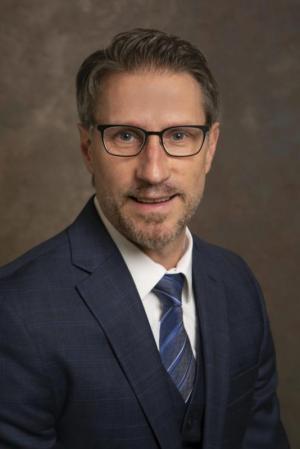Delaware education secretary outlines department priorities
A simple phone call to express his gratitude turned into an invitation for Delaware Secretary of Education Mark Holodick to present the department’s top four priorities to the Cape Henlopen school board Oct. 27.
As a Lewes resident with two daughters attending Cape High, Holodick said he enjoys reading the Cape Gazette and was prompted to call Superintendent Bob Fulton after reading the article detailing the decision to name the new middle school after educator Frederick D. Thomas.
Holodick said he had also gone through a school-naming process when he previously served as a superintendent of schools.
“I couldn't help but be incredibly proud as a Delawarean, as an educator, as a community member, that the school-naming committee took the time to really consider all the possibilities,” he said. “It appears to have been a runaway in terms of this particular naming, but by all accounts, Cape's first African American administrator was a true visionary leader.
“He was someone who identified educators who were going to serve as mentors and built relationships. And this philosophy of ‘it takes a village’ ... certainly by all accounts it sounds like he lived that. Who better to name a new educational institution after than Dr. Frederick Thomas?”
Holodick said he originally wanted to address the board to express his gratitude and pride as a parent for the naming choice, but then he called Fulton and things “turned more formal,” he said, as educators chuckled.
That said, Holodick detailed the Department of Education’s four priorities for the coming year, noting educators have a lot of catching up to do after the worst of the pandemic.
The safety and well-being of children is the department’s first priority, Holodick said. After the Uvalde school shooting last year, school superintendents and state legislators stressed that a greater investment in security is needed, he said, and $10 million was placed into the bond bill for personnel, programming and facilities to address security.
Making up for lost opportunities is the second priority, Holodick said, as educators know that students have fallen behind academically and socially as a result of the pandemic.
“It's part of our responsibility to catch them up,” he said.
State testing and National Assessment of Educational Progress scores are both down, he said, and while Cape has a lot to be proud of based on its student scores, more work needs to be done. Socially, students need to be offered as many opportunities as possible to be around each other and healthy adults who can help change the trajectory of kids' lives.
Summer and extra-time programming are essential to do this, Holodick said. He noted that he visited many summer programs, including one at H.O. Brittingham Elementary, which he said was arguably the most impressive one because it was formalized and focused. Part of the reason for its success, Holodick said, was likely because H.O.B. is a language immersion school which is very well structured and offered an academic element he did not see elsewhere.
Not all students need the extra programming, but others do, so it should be part of a district’s equity program like it is at Cape, he said.
Educator recruitment and retention efforts are the third priority, he said, noting the challenge is in the short term. The department has been flexible in working with districts to help paraprofessionals become teachers. Compensation will also have to be addressed, as the teacher shortage is a major crisis, he said.
And the fourth priority involves legislative commitments, he said, which each year puts the onus on the department to work with districts. In the two years since the passage of HB 198, also known as the Black history bill, much work has been happening, he said.
Many educators are not prepared to deliver what is required from the law because they don't know the history and weren’t taught it themselves, he said. Teachers will be in a better spot in five to 10 years, after they have been taught how to teach the principles and history while tying them to current events, he said.





















































